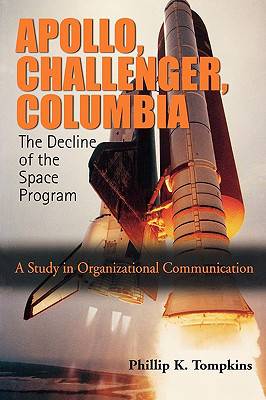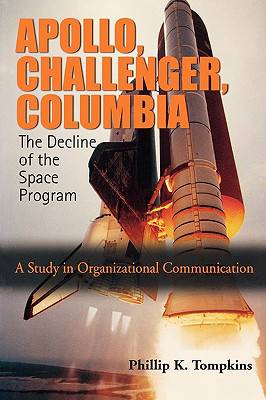
En raison d'une grêve chez bpost, votre commande pourrait être retardée. Vous avez besoin d’un livre rapidement ? Nos magasins vous accueillent à bras ouverts !
- Retrait gratuit dans votre magasin Club
- 7.000.000 titres dans notre catalogue
- Payer en toute sécurité
- Toujours un magasin près de chez vous
En raison de la grêve chez bpost, votre commande pourrait être retardée. Vous avez besoin d’un livre rapidement ? Nos magasins vous accueillent à bras ouverts !
- Retrait gratuit dans votre magasin Club
- 7.000.0000 titres dans notre catalogue
- Payer en toute sécurité
- Toujours un magasin près de chez vous
Apollo, Challenger, Columbia
The Decline of the Space Program: A Study in Organizational Communication
Phillip K Tompkins
Livre broché | Anglais
218,95 €
+ 437 points
Description
Apollo, Challenger, Columbia: The Decline of the Space Program provides unparalleled longitudinal insight into the organizational successes and failures of NASA. The book treats NASA over its 45-year history from 1958 to 2003, concentrating on five "data points" * 1967: when Tompkins first served as a Summer Faculty Consultant in Organizational Communication to legendary rocket scientist Wernher von Braun during the Apollo Program.
* 1968: when he served in the same capacity to help reorganize NASA's Marshall Space Flight Center.
* 1986: when he investigated the communication failures that caused the explosion of the space shuttle Challenger.
* 1987: when he researched NASA's highly successful Aviation Safety Reporting System.
* 2003: when he interpreted the communication failures leading up to the catastrophic failure of the space shuttle Columbia.
The result is a presentation of concrete communication correlates of organizational success and failure. Tompkins is a master of what Clifford Geertz called "thick description." The result is a compelling, richly detailed, longitudinal case study concentrating on processual changes in communication-as-organization. In this book, Tompkins introduces theory subtly, inserting it to explain details of the organization that would otherwise defy understanding. In considering other organizations in trouble, Tompkins identifies ten "communication transgressions," one of which, for example, is "ignorantia affectata"--an affected or cultivated ignorance of organizational problems. In contrast to these failed organizations and their pathologies, Tompkins offers a sketch of two healthy organizations that live by "value logics"--applying ethical values in the organizational workplace. There are lessons to be learned from NASA's disasters. With all of the high-profile ethical lapses in U.S. corporations, Tompkins advocates individuals and organizations taking responsibility for their actions.
* 1968: when he served in the same capacity to help reorganize NASA's Marshall Space Flight Center.
* 1986: when he investigated the communication failures that caused the explosion of the space shuttle Challenger.
* 1987: when he researched NASA's highly successful Aviation Safety Reporting System.
* 2003: when he interpreted the communication failures leading up to the catastrophic failure of the space shuttle Columbia.
The result is a presentation of concrete communication correlates of organizational success and failure. Tompkins is a master of what Clifford Geertz called "thick description." The result is a compelling, richly detailed, longitudinal case study concentrating on processual changes in communication-as-organization. In this book, Tompkins introduces theory subtly, inserting it to explain details of the organization that would otherwise defy understanding. In considering other organizations in trouble, Tompkins identifies ten "communication transgressions," one of which, for example, is "ignorantia affectata"--an affected or cultivated ignorance of organizational problems. In contrast to these failed organizations and their pathologies, Tompkins offers a sketch of two healthy organizations that live by "value logics"--applying ethical values in the organizational workplace. There are lessons to be learned from NASA's disasters. With all of the high-profile ethical lapses in U.S. corporations, Tompkins advocates individuals and organizations taking responsibility for their actions.
Spécifications
Parties prenantes
- Auteur(s) :
- Editeur:
Contenu
- Nombre de pages :
- 288
- Langue:
- Anglais
Caractéristiques
- EAN:
- 9780195330441
- Date de parution :
- 23-07-04
- Format:
- Livre broché
- Format numérique:
- Trade paperback (VS)
- Dimensions :
- 150 mm x 226 mm
- Poids :
- 453 g

Les avis
Nous publions uniquement les avis qui respectent les conditions requises. Consultez nos conditions pour les avis.






